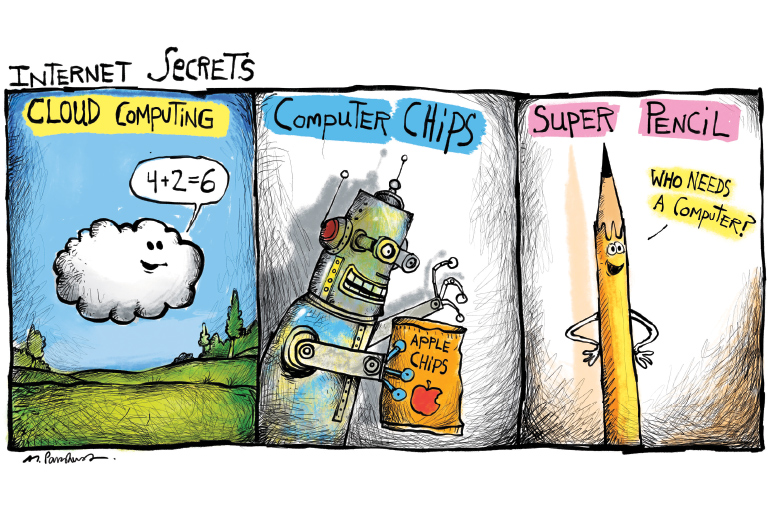Internet Secrets: The True Story – You Read It First in Dan’s Papers

Some things about the internet are very odd. It seems to have gotten off the ground at the same time that global warming got off the ground. Are they connected? Does one cause the other?
With monitoring instruments, we can see the stuff in the atmosphere related to global warming, but we can’t see the internet. It’s invisible. And silent. It seems to go away without explanation from time to time. But there’s no slamming of doors when it goes, no opening of doors or windows when it comes back. We cheer when it comes back. But the internet can’t hear our cheers. Do we even know if it knows, in some strange way? Do we even know if it cares?
One clue about it comes when you go to the warehouses where massive hard drives store everybody’s data. The hard drives give off a great deal of heat. The warehouses have to be loaded with air conditioning to keep the temperature stabilized. Hmm.
On behalf of the readers of Dan’s Papers, I have looked into this situation more closely, and what I have found out is shocking. The ah-ha moment came on the day in January when the New England Patriots were meeting the Kansas City Chiefs in a playoff game. I have been keeping what I found to myself since then. But now I am going to tell you about it.
I was running late and couldn’t get to the TV for the beginning of the game. But I was able to keep track of it by using the Sports App on my phone.
My Sports App did not have the rights to broadcast the game. But they have a workaround. It consists of a cartoon of a football field. It sits in the middle of the screen, a green patch, with the yard markers in white. On it is a football resting where a play is about to happen. Then it happens. And a printed description appears, giving the essence of the play.

“Brady drifts to the right and throws a pass to Edelman on the sideline marker, which he catches and runs for nine yards. Tackle by Wilson of the Chargers.”
The ball on the green patch now slides along the nine yards and comes to a stop.
“Second down and one,” comes on the screen.
Watching this, I was able to keep up with the game until I arrived at my seat in the living room. And then I discovered its secret.
On our 55-inch TV, Brady faded back, eluded a tackler and threw to Gronkowski. But a guy named James knocked it out of his hands, incomplete.
On my cell phone, just one second later, this typing appears. It reads “Brady fades back, eludes a tackler and throws down the center of the field to Rob Gronkowski, but linebacker James knocks it away with his left hand.”
How could they do this? No computer program I’ve ever heard of could get all this detail. But there it is, just one second from the time it happened.
I was stunned. It had to be typed in by somebody watching the game on TV somewhere. It’s like closed captioning, which is typed in, and is often filled with misspellings, which we forgive because it’s such a rush job.
But the thing is that on my Sports App, there are hundreds of games going on simultaneously in different sports. Tennis match explanations appear in writing almost at the moment they happen. Hockey explanations appear in writing at the moment they happen. Baseball game explanations appear in writing when they happen.
The only answer to this is that there have to be thousands, maybe even millions, of people, probably young people, who are employed in typing things onto “the internet” in this way, three shifts of eight hours each, 24–7.
It’s an incredible secret.
That night I watched the old movie A League of Their Own, about the women’s professional baseball league games that were played in the Midwest during 1943. Tom Hanks played the part of the manager for one of the teams, and he was drunk much of the time.
In one scene, a small crowd of 5,000 people, sitting on the stadium benches, watched a game. The interesting part was out in back of the left field fence, where some 10-year-olds manipulated the numbers on a scoreboard. There were no electric scoreboards then. Just slots in a huge rectangular board attached to the fence, where white numbers on black squares could be slid down into slots from behind, so, from the front, it would appear that numbers got magically changed.
In one game, Geena Davis, the actress, was shown hitting the ball over the fence. While one boy chased the ball, another boy in back of the scoreboard took the number 1 out from a pile, walked it over to the back of the scoreboard, climbed a ladder with it, slid the 0 out of one slot and slid in his 1. Magic. The first internet. The Rockford Peaches lead 1 to 0.
Signing on to do this with my Sports App is not something today that true-blooded Americans would ever do. There is only one possible place where this many young people could do this. And that is in China. Children learn English early in China. And they can be taught football. In China, where there are one billion six hundred million people, you tell some kids to do something and they do it.
And, as they steal American ideas, they steal this idea from watching that movie.
Is there any other place where this work could be done? Yes, there is. India. Our friend. There are one billion three hundred million people in India, and I suspect if we can harness this crowd, we can make trouble for China. You better believe it. And—this is a good sign—the total Indian population is increasing faster than the total Chinese population.
And that explains the so-called internet. It’s a big fraud. You read this first in Dan’s Papers.




